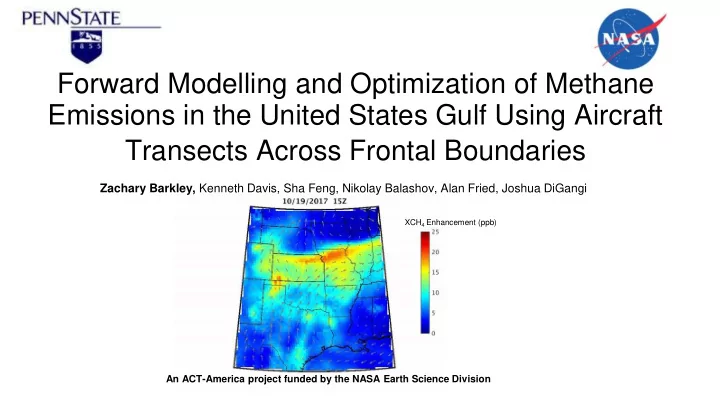

Forward Modelling and Optimization of Methane Emissions in the United States Gulf Using Aircraft Transects Across Frontal Boundaries Zachary Barkley, Kenneth Davis, Sha Feng, Nikolay Balashov, Alan Fried, Joshua DiGangi XCH 4 Enhancement (ppb) An ACT-America project funded by the NASA Earth Science Division
Shameless ACT-America Plug Winter 2017 Summer 2016 Fall 2017 Spring 2018
Observed Boundary Layer Methane (ppm) Oct 18, 2017 Oct 21, 2017
40% of anthropogenic methane emissions in the US
Southerly winds begin 2 days of steady state Plume converges at front
Optimization of Methane Sources: Oct 18th, 2017 Oil and Gas Animal Agriculture Everything else CH 4 Enhancement (ppm)
Optimization of Methane Sources: Oct 18th Oct 18, 2017 Oct 18, 2017 Original Optimized CH 4 Enhancement (ppm)
We’re really good at recreating the total methane plume Ethane Optimization r=0.89 :) r=0.80 :( r=0.89 :)
...but not so great with knowing which source to attribute it to.
Major methane sources in the Gulf
Major ethane sources in the Gulf
10/21/2017 Methane Enhancement (ppm) Ethane Enhancement (ppb) 10/21/2017 20:00Z
Ethane Optimization r=0.80
10/21/2017 O&G mix Ethane (ppm) Animal Ag ??????? 0.06 ~0.00 0.80 Methane (ppm)
Animal Agriculture ends up at 1
Conclusions: -Frontal weather events may be useful at quantifying emissions from various sources. -There’s more methane in these frontal flights than is in the EPA’s gridded methane inventory. -High ethane values indicate that the O&G sector is likely responsible for this discrepancy (factor of 2 increase). No evidence that animal agriculture deviates from inventory estimates.
Shameless ACT-America Plug Winter 2017 Summer 2016 Fall 2017 Spring 2018
Recommend
More recommend